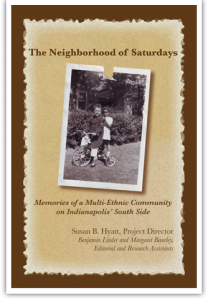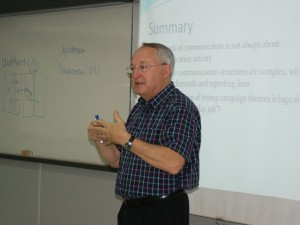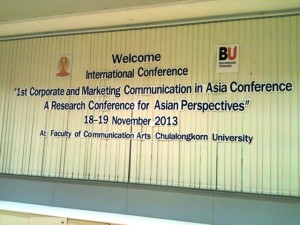A new Erasmus Fusion Investment Fund for staff mobility and networking was awarded to Dr Clive Hunt, Lead Academic – Design and Engineering, Faculty of Science and Technology. This follows a recent Erasmus partnership agreement between BU and the University of Applied Sciences (FHWS) in Schweinfurt, which is situated in Franconia, Germany – one of Europe’s oldest wine-growing regions and described as “a land of wine and beauty” by the Franconian Tourist Board.
As reported in a previous blog, the educational focus of FHWS is on design and engineering with a strong business/industrial focus. Clive’s visit to Germany, which has now taken place, was for a period of five days and included six hours of teaching as well as networking with two of FHWS’s industrial partners – ZF and Bosch and Siemens Home appliances (BSH). ZF is a worldwide leading supplier of dampers and clutches to the automotive industry and BSH’s product portfolio, which most will be familiar with, spans the spectrum of modern household appliances from stoves and ovens to small appliances like vacuum cleaners and coffee machines.
From visiting these companies, as well as talking to staff and students at the university, it became very clear that the mind-set of the German industrial sector was such that it saw an active role in undergraduate development. Prof Dr Marcus Schulz of FHWS, explained that the German industrial sector saw placement students as being particularly valuable in helping to solve business problems and he commented that “the university’s industrial partners actually compete for students!” Companies provide undergraduates with a five month placement opportunity as well as providing almost all students with a final year project (thesis).
To further the strategic partnership between our two institutions, Clive’s visit included meetings with the University’s Vice President, Prof Dr -Ing Bernhard Arndt as well as Prof Dr Uwe Sponholz, Dean of the Faculty of Business and Engineering. Developing joint research projects as well as encouraging student mobility between our two institutions is clearly a priority of FHWS and this aligns to the Faculty of Science and Technology’s (SciTech) own interest in furthering research and academic collaboration. From the beginning of next academic year FHWS will be delivering its courses in English which will provide SciTech students with an opportunity to study part of their degree abroad, providing units at BU can be aligned with theirs and delivery problems in terms of timing, etc., can be overcome.
One area in which FHWS is keen to develop its research is around creativity and ideas generation by engineers and their managers and the university has recently developed one of its teaching spaces into a “Creative Cube” for this purpose. This room consists of a 70” touch screen computer, webcams, video cameras, an ambience ceiling with 40,000 LED’s, iPads, notebooks, relaxing chairs, a device that changes the smell of the room as well as having walls that are magnetic and which can be written on. If there are any colleagues, here at BU, who would like to get involved in a joint pedagogical research project between ourselves and FWHS, that considers how learning is impacted upon by the environmental conditions of a teaching space then please get in touch with Clive (chunt@bournemouth.ac.uk).
Tagged / Fusion Investment Fund
Successful Fusion Investment Fund Award – Study Leave Strand
Caroline Belchamber, a part-time physiotherapy lecturer, Doctor of Professional Practice (DProf) student and private practitioner has successfully been awarded Fusion Investment Funding for six months study leave enabling her to finalise her doctorate.
Caroline currently has a contract with a local hospice developing a breathlessness clinic for people with chronic lung conditions. She also holds an honorary contract with another local hospice, where her research is being carried out. Caroline identified the need for further research following her MSc research in 2002 on rehabilitation in the context of palliative cancer care. She observed the need to determine service users and health care professionals’ understanding of the benefits of physiotherapy and whether the profession is meeting National Standards and best practice recommendations in the area of supportive and palliative cancer care. Caroline’s case study research uses a mixed qualitative methods approach to identify the extent to which physiotherapy palliative cancer care service provision meets best practice recommendations. Caroline’s research has been funded by the Chartered Society of Physiotherapy (CSP) Charitable Trust and the Association of Physiotherapists in Oncology and Palliative Care (ACPOPC). It was also given the support of the Dorset Cancer Network Service Improvement Facilitator in 2009. It is anticipated that Caroline’s work will place BU at the forefront of this evolving area of practice.
Caroline is supervised by Professor Elizabeth Rosser and Dr. Caroline Ellis-Hill
BU Researchers launch a new online copyright resource at the AHRC Creative Economy Showcase London

 Following the internal launch at BU on the 14th February 2014, BU Researchers at the Centre for Intellectual Property Policy and Management (CIPPM) launched the Copyrightuser.org at The Arts and Humanities Research Council (AHRC) Creative Economy Showcase.
Following the internal launch at BU on the 14th February 2014, BU Researchers at the Centre for Intellectual Property Policy and Management (CIPPM) launched the Copyrightuser.org at The Arts and Humanities Research Council (AHRC) Creative Economy Showcase.
The event was held at Kings Place, London, on Wednesday 12th March 2014. The Showcase demonstrated the outputs and innovations of AHRC investments in the Creative Economy through presentations, workshops and exhibitions. The sectors exhibited on the day, included fashion, design, video games, architecture, broadcasting, archives, digital technologies and dance.
Amongst the various funded initiatives showcased on the day, Copyrightuser.org held a prominent exhibition stand and exhibited the website which was complemented by large posters, bookmarks and myth/reality cards (illustrated below) which explained the most common myths about copyright.
This high-profile event was attended by over 450 delegates and included policy-makers, business leaders in the creative industries, knowledge exchange practitioners, directors of research in universities, senior representatives from partner organisations in the Creative Economy, other strategic funding agencies in the sector, representatives from the AHRC’s investments in the Creative Economy and other stakeholders.
Keynote speakers included amongst others Sebastian Conran (Designer), the Hon David Willetts (Minister of State for Universities and Science), Ed Vaizey MP (Minister for Culture, Communications and Creative Industries) and Professor Rick Rylance (CEO, AHRC).
Highlights from the day can be streamed here.
Copyrightuser.org was funded by the BU Fusion Investment Fund in 2012 and was developed by the Business School’s Centre for Intellectual Property Policy and Management (CIPPM) in collaboration with Centre for Excellence in Media Practice (CEMP). Following the success of the Fusion Funded project, the CIPPM-led team went on to secure RCUK funding provided by CREATe in August 2013 to extend the scope of the project. Phase II of the copyrightuser.org is now underway.
The launched online resource aims to make UK copyright law accessible to creators and members of the public. This 1-minute video captures the concept behind the Copyrightuser.org project.
Using quantitative and qualitative methods the site aims to provide answers to the most pressing concerns that creators and the public have about copyright law. To achieve these aims, interviews with creators where conducted and a video for each creative sector was produced demonstrating their thoughts and questions about copyright, see the musicians video here for example. Secondly, 200 frequently asked questions posted by users online were sourced, analysed and coded down to the 20 most common.
The Copyrightuser.org has so far been received very well as evidenced by the positive feedback from various organisations, individuals, legal professionals and the creative industries.
During the launch, the website received 232 visits; and has now received over 1,558 visits to date.
Please also visit our twitter page – @copyrightuser to keep up with the Copyrightuser.org developments.
The copyrightuser.org team consists of:
Dr. Dinusha Mendis (Principal Investigator & Co-Director CIPPM)
Mr. Bartolomeo Meletti (Lead Multimedia Producer and CIPPM Research Assistant)
Ms. Hayleigh Bosher (PhD Candidate (Copyright) and CIPPM Research Assistant)
Professor Martin Kretschmer (Principal Investigator & Director CREATe)
Dr. Kris Erickson (Co-Investigator, CREATe).
The team is further assisted by a Production Team consisting of Marco Bagni (Art Direction, Design and Animation), Sar:co (Music and SoundFX), Davide Bonazzi (Illustrations) amongst others and an Editorial Board consisting of Professor Maurizio Borghi (Director, CIPPM); Professor Ruth Towse (Co-Director, CIPPM); and Professor Ronan Deazley (Professor of Copyright Law, University of Glasgow) amongst others.


Fusion – Exploring Histories of Women’s Radio in Europe
I am delighted to report that I, and my Co-investigator Dr Kate Murphy, have been successful in our Fusion Investment Fund bid, which will support an international academic research network Women’s Radio in Europe Network (WREN) that I have played a key part in developing since 2012.
WREN investigates the history and role of women’s radio in Europe and at the centre of this inquiry stands the idea of radio’s double articulation as both (domestic) technology and medium of communication. Women broadcasters and women’s radio provides a lens through which a number of histories and transnational flows can be analysed. Up till now, most women’s radio histories have mainly been examined within national contexts or narratives. These highlight the important role played by women’s radio in times of social change, financial and political crisis and modernisation. Yet, there has been no systematic research to the various patterns of transnational circulation mediated through women’s radio, nor a sustained comparative research. A vital aspect of WREN’s work is making these transnational connections between women, radio and society visible and accessible to researchers, practitioners and publics.
Funding was sought from the Staff Mobility and Networking Strand (SMN) and will enable a WREN workshop to be held at BU in the autumn (2014). WREN currently includes active members from the UK, Netherlands, Turkey, Denmark, Portugal, USA and Australia. The aim of WREN is to develop international collaborative research exploring women’s radio histories. The fusion funding will enable us to organise the first stand alone meeting of the network at BU. The aim of this meeting is to further develop plans for publications, bids for future external funding, and to build and develop our current web presence (http://womensradioineurope.org/). The workshop will also include an open seminar to which staff and students will be invited to attend. This is exciting news and I am looking forward to start planning and preparing!
Dr Kristin Skoog Lecturer in Media (Broadcasting History) – The Media School
ENABLE: Reflections on a Fieldtrip
The barrier to the ‘resort’ was shut when we arrived but our interpreter told the guard that we were indeed going to the Tasik Chini Resort – the only place one can go after passing through the gate. After deliberation, he let us proceed.
The receptionist indicated that tonight we had two rooms rather than the one room we had booked, having asked for two extra beds in the room for the children. One room had a twin bed and a mattress, and the other a single bed, but she said she would sort it all tomorrow. We paid in full after debating three or four times what the actual price was for the stay; a kind of mental gymnastics that pulls the mathematical body into contorted shapes only vaguely resembling the original anatomy from whence it came.
The rooms: interesting that the room with the twin beds and a ‘mattress’ was exactly that; no sheets or blankets just the mattress. The other room, however, looked more promising at first sight. There were in fact two beds there not one. OK, so the toilet ballcock was gone and water was constantly overflowing from the cistern onto the bathroom floor, but TWO beds!
So, we divided the children, given they didn’t want to sleep without an adult, sprayed the rooms with insecticide and prepared for the night. It was then that I (Jonathan) looked at the two beds and saw that whilst one was fine, the second was covered by dead, dying and some struggling ants and assorted insects; and the toilet was still dripping, resonant off the hollow dampness of Derbyshire’s Blue John mines! That bed couldn’t be slept in as I then preceded to spray it.
So, back to plan A with me (Sara) and one of the girls in the bed and one on the mattress. But, just a minute, there’s a mattress but no covers or pillow. No that’s not going to work so three in a bed it is, with some topping and tailing, and me back to the bed in the other room keeping the insects at bay and drowning the noise of the leaking cistern by air conditioning that’s making everything too cold and dry.
Fieldwork is, of course, meant to be a little uncomfortable and sometimes evocative of van Gennep’s ‘rite of passage’, a gaining of one’s socio-anthropological spurs! However, we are staying at what purports to be the premier resort for Tasik Chini. This is important because, until 2004 – (and here I (Jonathan) had to stop writing for a while to scratch that itch that turned out to be a troop of ants seeking solace in my bed) – in 2004 eco- and ethno-tourism (although somewhat contested) was seen as an important means of securing the economy of the area. It seems now, a decade on, that this resort finds anyone staying a rather irritating yet bizarre intrusion into a life that happily runs purposelessly for itself, except for weekend weddings, or as a place for the army cadets to stay and practice manoeuvres through the night. (Manoeuvres punctuated by eerie whistles, commands and shouts!) And, rather perversely, it seems that staff cannot get a single order right, no matter how small or precisely articulated it is: kopi ice O kosong (black iced coffee, without sugar) usually has milk and sugar in it; roti bakar (toast), if it comes at all, takes longer (much longer) than nasi goreng (fried rice)!
It also seems to evoke, more seriously, something that mimics the tragedy happening to the lake in bio-environmental terms and, from a human perspective, to the Orang Asli people living around the lake. It is an intrusion into the ill-thought plans of others or an encumbrance to manage that imposes rather than seeks dialogue!
And still the dripping cistern spits! (Should have consulted ‘Tripadvisor’ first http://www.tripadvisor.com.my/Hotel_Review-g298291-d2213723-Reviews-Lake_Chini_Resort-Pahang.html!)
Jonathan Parker & Sara Ashencaen Crabtree
Developing Student-Community Research Collaborations in Sociology and Anthropology at BU

BA Sociology and Anthropology and BA Sociology and Social Policy are two relatively new degree programmes at BU. As someone who teaches across both programmes, and coordinates the BASA programme, I felt that we needed to offer our students more in depth experience of conducting sociological and anthropological research at first hand. One of the things that has often prevented our team from doing this to date has been the difficulties of meeting research ethics requirements within standard unit delivery timescales.
Last summer I invited Dr Susan B. Hyatt, an Associate Professor at IUPUI in Indianapolis, (and at that time on sabbatical at Durham University) to come to HSC to talk about her collaborative research with her students. Dr Hyatt’s innovative approach to providing research skills training to her undergraduate anthropology students entails bringing them together with local community organisations in Indianapolis to collaboratively design feasible research projects of benefit and interest to both parties. An example of one of Dr Hyatt’s award winning publications co-authored by students and academics can be found here.
As part of a successful FIF bid for study leave, I will be going to Indianapolis in early 2015 to gain insights on how Dr Hyatt and her students establish relationships with community groups; how student research projects are devised and coordinated to a set timescale; how students are trained to use various research techniques to gather data ethically; how the projects meet relevant research ethics requirements and how their findings are disseminated. Following this, on returning to Bournemouth I plan to work with community development practitioners/organisations in West Howe with whom I have already established contacts during recent research, to identify specific areas for collaborative research with year two BASSP and BASA students. Longer term, I hope this project will promote more staff-student collaborative research, publishing the best student work in the eBU journal and disseminating it at events such as the Festival of Learning. In addition, the intention is that in learning how to work collaboratively to develop research projects with community groups and organisations in response to their needs and concerns, students will gain transferable skills of value to employers, and communities will see the value students can bring through their studies.
Dr Rosie Read
Email: rread@bournemouth.ac.uk
PR education history archive now online
An insight into the first decade of PR education in the UK has just been posted online. It is the archive of the Public Relations Educators Forum (PREF) from 1994 to 1999, its most active years. It can be found at: http://microsites.bournemouth.ac.uk/historyofpr/files/2010/03/PREF-Archive-1994-1999.pdf
Catalogued by Professor Tom Watson of the Media School, it illustrates the growth of PR education which began in 1987 in Scotland and a year later in England. PREF was founded in 1990 to bring the new cohort of PR educators together and help negotiate the academia-industry connection. As Bournemouth University (then Dorset Institute of Higher Education) was one of the first two UK universities to launch undergraduate studies in PR, the PREF archive also adds to university history.
It wasn’t an easy relationship with particular tension in the mid-1990s over industry’s attitude to the quality of graduates and its desire to impose a skills-led training curriculum on universities. This was resisted by PREF, as correspondence and evidence of meetings shows.
“This archive shows the teething pains of new academic-led education faced with industry’s desired for trained technicians. The positive news is that PR was an academic area in which women took leading roles from the outset,” Prof Watson said. The online archive contains copies of PREF’s newsletters and membership lists which show the rapid expansion of PR education in the UK.
The PREF archive is one of several projects to advance scholarship in public relations history being developed by Prof Watson during his Fusion Investment Fund-supported Study Leave.

The ceremonial landscapes and funerary monuments of southern Britain
Following a successful application to the Fusion Investment Fund I have been awarded a period of Study Leave, to move on a body of research to publication. Under the umbrella title of ‘ The ceremonial landscapes and funerary monuments of southern Britain’ I will be bringing together material from seven seasons of archaeological field work focussed upon the later Neolithic and Early Bronze Age monuments found in the Allen Valley on Cranborne Chase in east Dorset. The cluster of henge monuments at Knowlton and a dense concentration of round barrows associated with them have been an important factor associated with my research interests since 1994. This grouping of broadly contemporary archaeological monuments has up until recently been under explored even though the importance of the group it can be argued is on a par with better known ceremonial complexes such as those at Stonehenge, Avebury and Orkney.
Amongst the discoveries made during the fieldwork was the discovery of a late Neolithic house, one of the most complete examples thus far discovered in the UK and an unusual mortuary complex which offers important and exciting new insights into the burial ritual and practices at the beginning of the 2nd millennia BC.
The study leave period will be starting in the late summer and I am very much looking forward to the dedicated space and time so necessay to bring together this large body of work.
Gender Equality in Asian Workplaces Workshop
Happy Chinese New Year! May you all have a successful year of horse ahead!
Today is the 4th day of the Chinese new year and it is only appropriate to invite you to this one day workshop jointly funded by BU Fusion Investment Fund and the British Academy of Managment (BAM).
Descriptions
The rise of Asian economies in the last few decades has created unique opportunities for women to develop. Yet, compared with Western women, Asian women often find it more difficult to progress in the workplace because of inherent cultural and societal barriers. This one-day workshop adopts a cross-disciplinary perspective, looking at women’s employment and careers in five Asian societies.
When: This event will take place on 8th May, 2014.
Who should attend: Researchers and students who are interested in gender issues in Asia
Benefits of attendance
- Enhanced cross-cultural understanding
- Recent debates in women’s development in Asia with insight from leading academics in the field
- Networking opportunities with scholars and practitioners from Gender in Management SIG
Location: Bournemouth University, Business School, Executive Business Centre (Room 708), 89 Holdenhurst Road, Bournemouth, BH8 8EB
Contact: Dr Huiping Xian, Lecturer in HR/OB, Bournemouth University Business School, hxian@bournemouth.ac.uk
Booking Deadline: 30th April, 2014
Programme
| 10:00-10:30 | Welcome and coffee |
| 10:30-11:15 | Gender Equality in India: Constitutional Challenges and Contesting DiscoursesProfessor Ratna Kapur, Jindal Global Law School, India |
| 11:15-12:00 | Women Managers’ Careers in China: Theorizing the Influence of Gender and CollectivismProfessor Carol Woodhams, University of Exeter, UK
Dr Huiping Xian, Bournemouth University, UK Dr Ben Lupton, Manchester Metropolitan University, UK |
| 12:00-13:00 | Lunch |
| 13:00-13:45 | Contextual Emotional Labour: An Exploratory Study of Muslim Female Employees in PakistanDr Jawad Syed, Kent Business School, University of Kent, Kent, UK
Dr Faiza Ali, Kent Business School, University of Kent, Kent, UK |
| 13:45-14:30 | Does Nationality Impact Identification with Prevalent Models of Career Success?: The Case of A Global Bank.Dr Savita Kumra, Brunel University, UK |
| 14:30-14:45 | Tea and Coffee |
| 14:45-15:30 | An Investigation of the Determinants on Women’s Career Advancement in China: A Large Sample Analysis of Chinese Listed CompaniesDr Li Cunningham, Cass Business School, City University, UK
Dr Xiancheng Shi, School of Economics, Nanjing University, China |
| 15:30-16:00 | Plenary Discussion |
| 16:00 | Close |
It’s deadline day for Fusion Investment Fund applications
If you would like to apply to any strands of the FIF please make sure you submit your application by the deadline which is 2pm today! No exceptions will be made to this deadline.

For all the updated strand policy documents, Fund FAQ’s and information about applying, please visit the FIF intranet pages.
The Fusion Investment Fund is managed by Samantha Leahy-Harland. Please direct all initial enquiries to the Interim Fusion Administrator, Dianne Goodman, at Fusion Fund.
Friday the 13th, unlucky for some, but not for FIF applicants! Last chance to apply!
If you would like to apply to any strands of the FIF in this round please make sure you submit your application by the deadline which is 2pm on Friday 13 December. No exceptions will be made to this deadline.
For all the updated strand policy documents, Fund FAQ’s and information about applying, please visit the FIF intranet pages.
The Fusion Investment Fund is managed by Samantha Leahy-Harland. Please direct all initial enquiries to the Interim Fusion Administrator, Dianne Goodman, at Fusion Fund.
Free money! Free money! 1 week left to apply-FIF!
Okay so it’s not exactly free….you will have to do something for it but what if I told you that you will be hailed within BU, and who knows, maybe the world, as a researcher/support staff member extraordinaire! Your peers will bow down in the corridors in your honour, you will be met with applause when you enter the atrium.*
 I know what you’re thinking….’This sounds brilliant! Where can I find out more?’ Just point your mouse here, my friend, and all will be revealed.
I know what you’re thinking….’This sounds brilliant! Where can I find out more?’ Just point your mouse here, my friend, and all will be revealed.
*This may not actually happen.
The Fusion Investment Fund is managed by Samantha Leahy-Harland. Please direct all initial enquiries to the Interim Fusion Administrator, Dianne Goodman, at Fusion Fund.
Want some money?
I thought that might get your attention! The latest call of the FIF (or the ‘Fusion Investment Fund’ for those of you who haven’t yet added this acronym to your vocabulary) is open for 2 more weeks so if you haven’t applied yet or haven’t seen my previous blog posts, let me give you the highlights:
So basically you could be given a pile of cash to enable you to do what you love! Pursue that dream of undertaking world-leading research or travel across the pond to work collaboratively with experts in your field. Become a hero and take your rightful place on that pedestal that your peers and students will put you on.*
Sound good? Find out more.
*BU cannot guarantee this.
The Fusion Investment Fund is managed by Samantha Leahy-Harland. Please direct all initial enquiries to the Interim Fusion Administrator, Dianne Goodman, at Fusion Fund.
Bangkok conference “a big success”
Speakers and delegates from 10 mainly Asian countries voted the 1st International Corporate and Marketing Communication in Asia Conference, held in Bangkok on November 18-19, “a big success”
The FIF-supported conference went so well that planning is already under way for the 2014 conference, also to be held at Chulalongkorn University in the Thai capital.
Representing BU at the conference were Prof Tom Watson, a co-organiser, and Dr Ana Adi, both of the Media School. Tom was a second day keynote speaker while Ana presented the outcome of research by her and Nathaniel Hobby on social media monitoring in higher education.
The conference, held at the Faculty of Communication Arts, was opened by the host’s Vice-President, Assoc Prof Dr Sittichai Tudsri. Including the Thai and UK organisers, 30 papers were presented by academics from Australia, Egypt, Germany, Hong Kong, India, Indonesia, Malaysia, and Singapore.
“The conference especially sought Asian perspectives: alternatives to Anglo-American models of theory, practice and education. In this aspect it succeeded to everyone’s satisfaction,” Prof Watson said. “I believe that several international joint research projects will develop from the 2013 conference, which is also a major step forward.”
He said that delegates had welcomed the conference as filling a major gap in corporate and marketing communication academic discourse in Asia. “This reflected well on BU and I’m grateful for the FIF support that helped us devise and develop the conference. It’s an investment that has long term reputational and research value.”
Already, a Media School team researching CSR has linked with colleagues at Chulalongkorn University and a further connection with an Indonesian researcher may follow soon. The BU-Chula link was confirmed at the conference.
ENABLE: Establishing Sustainable Research Networks and Building Learning Environments
As part of the Fusion Investment Fund, we (Prof Jonathan Parker & Dr Sara Ashencaen Crabtree) won a study leave grant throughout the current academic year.
Our project aims to create sustainable research and education opportunities across BU through the establishment of a social science research, education and professional practice network with Southeast Asian and Asian universities. An aim which also enhances and builds on our personal research agendas that will lead to the development of robust Research Council funding applications, and contribute to fusion and the BU 2018 vision.
The project will identify, scope and establish a sustainable social science research academic network across BU. This aim has been initiated through discussion with some key individuals in BU and the potential to develop, in 2014-15, research council bids in respect of:
a. gender relations and practices in the professions
b. understanding the ways in which conflict resolution is culturally specific and that learning can enhance our opportunities for establishing social cohesion and a reduction of conflict
c. examination of the neo-imperialism of research ethics scrutiny from Western perspectives
d. it may also lead to work in respect of sustainability in the lives of indigenous peoples.
The core part of the study leave will develop and conduct research and research collaboration in Southeast Asia, predominantly Malaysia but including Cambodia, and Hong Kong. As part of our study leave we have both been awarded visiting Professor status at Universiti Kebangsaan Malaysia (UKM) in Kuala Lumpur where we will spend January until April 2014, followed by visiting professorships at Universiti Sains Malaysia (USM) in Penang from April until July. We will also be visiting universities in Hong Kong, Cambodia and Universiti Malaysia Sarawak (UNIMAS) in Kuching, East Malaysia.
Four core fusion and BU 2018 objectives underpin our project. These will result in funded research bids, increased student experience, and reputational enhancement for BU, and will be achieved through four workstreams:
Research:
1. establish a sustainable research network promoting social sciences and interdisciplinary research at BU (workstream 1).
2. develop research streams of locally specific or cross-cultural relevance (workstream 2).
Education:
3. engage and promote educational initiatives via guest lectures/research seminars, developing joint postgraduate research supervision and educational initiatives promoting student mobility, e.g. credit transfer (workstream 3).
Professional Practice:
4. engage in discipline-specific activities in relation to social work/development and welfare (workstream 4).
We have been invited to join the Tasik Chini Research Centre at UKM, a centre dedicated to research concerning the ravaged freshwater lake near Kuala Lumpur. As part of our research we will be undertaking an ethnography and conflict resolution narrative work with the Jakun tribe of the Orang Asli (the indigenous people of the region) with a view to promoting the marginalised voices of these people, disenfranchised by modernising agendas. We will also be researching approaches to unfair and wrongful discrimination in social welfare practices in the UK and Malaysia.
We look forward to keeping BU colleagues up-to-date with our work in Southeast Asia through our blogs. For those interested in developing research across these areas please contact us as we wish to ensure that social science research is highlighted across BU.
BOOK yourself into our last FUSION Awareness Session or our Bid Writing Workshop – Get as much help as you can…

For those of you who missed out on our valuable Fusion Awareness session yesterday Wednesday the 13th of November do not panic we are holding one more more session on:
Monday the 18th of November at 2-3pm in The Casterbridge Room (THS) Poole House – Talbot Campus
For any questions that you may have on Fusion specifically or for more information on the scheme and application process we would recommend you attend this last session (before the deadline – 13th of Dec at 2pm) where the manager of the Fusion Investment Scheme (FIF) Sam Leahy-Harland will be on hand with some of the Fusion panel committee members to answer your questions and to run through some useful information on applying to the scheme.
We also have some spaces on the Fusion Awareness Workshop Targeting the Fusion Fund with Martin Pickard on:
Wednesday the 20th of November from 9:30 – 12 midday in Christchurch House (CG04) on Talbot Campus
This Workshop is an ideal opportunity to get some tips and advice from our expert bid writer and to further improve your chances with your own Fusion bid applications
If you wish to book into either the Fusion Awareness Session on the 18th of November or the Fusion Workshop on the 20th of November with Martin please would you send me an email Dianne Goodman ASAP and I’ll get you booked in.
Don’t delay and give yourself the best chance !!!
With three funding strands available for staff there are a wealth of opportunities for both academic and professional support staff to take advantage of:
- Co-Creation and Co-Production strand (CCCP)
- Study Leave strand (SL)
- Staff Mobility and Networking strand (SMN)
In the July round:
- the Staff Mobility and Networking (SMN) strand committee funded 18 applications in July totalling £73K.
- the Study Leave strand (SL) committee awarded £107K.
- the Co-Creation and Co-Production (CCCP) strand was the most popular of the three in round one with 47 applications. A total of £92K was awarded to successful applicants.
For all the updated strand policy documents, Fund FAQ’s and information about applying, please visit the FIF intranet pages.
Hurry the FIF up! 4 weeks until the deadline!

If you haven’t already sent in your application, don’t panic! There’s still time. With three funding strands available for staff there are a wealth of opportunities for both academic and professional support staff to take advantage of:
- Co-Creation and Co-Production strand (CCCP)
- Study Leave strand (SL)
- Staff Mobility and Networking strand (SMN)
In the July round:
- the Staff Mobility and Networking (SMN) strand committee funded 18 applications in July totalling £73K.
- the Study Leave strand (SL) committee awarded £107K.
- the Co-Creation and Co-Production (CCCP) strand was the most popular of the three in round one with 47 applications. A total of £92K was awarded to successful applicants.
For all the updated strand policy documents, Fund FAQ’s and information about applying, please visit the FIF intranet pages.
The Fusion Investment Fund is managed by Samantha Leahy-Harland. Please direct all initial enquiries to the Interim Fusion Administrator, Dianne Goodman, at Fusion Fund.
Professional services staff can apply too….FIF-tastic!
Not only does the Fusion Investment Fund provide opportunities for academic staff at BU, there are also options for professional services staff:
Staff can apply to Erasmus which is most appropriate for enabling academic and professional staff based at higher education institutions (HEIs) to spend a period of training or teaching between 5 working days and 6 weeks in a European HEI or enterprise. Under training mobility, the purpose is to allow the staff members to acquire knowledge or skills relevant for their current job and their professional development and to help create cooperation between organisations. There are also opportunities to invite staff from enterprises to Bournemouth University to give presentations and provide teaching. Professional staff can undertake training at a European educational institution.
Another option is to apply to the standard element of the Staff Mobility and Networking (SMN) strand. Non-academic staff must be able to demonstrate through their application how their travel will benefit the academic process within BU and particular focus should be placed on the creation of sustainable collaborative networks of academics or professionals linked to specific outputs or partnership developments.
For more information please read the relevant policy documents and information available on the FIF intranet pages.
The Fusion Investment Fund is managed by Samantha Leahy-Harland and the Interim Administrator is Dianne Goodman. Please direct all initial enquiries to Fusion Fund.
















 Nursing Research REF Impact in Nepal
Nursing Research REF Impact in Nepal Fourth INRC Symposium: From Clinical Applications to Neuro-Inspired Computation
Fourth INRC Symposium: From Clinical Applications to Neuro-Inspired Computation ESRC Festival of Social Science 2025 – Reflecting back and looking ahead to 2026
ESRC Festival of Social Science 2025 – Reflecting back and looking ahead to 2026 3C Event: Research Culture, Community & Cookies – Tuesday 13 January 10-11am
3C Event: Research Culture, Community & Cookies – Tuesday 13 January 10-11am Dr. Chloe Casey on Sky News
Dr. Chloe Casey on Sky News ECR Funding Open Call: Research Culture & Community Grant – Application Deadline Friday 12 December
ECR Funding Open Call: Research Culture & Community Grant – Application Deadline Friday 12 December MSCA Postdoctoral Fellowships 2025 Call
MSCA Postdoctoral Fellowships 2025 Call ERC Advanced Grant 2025 Webinar
ERC Advanced Grant 2025 Webinar Horizon Europe Work Programme 2025 Published
Horizon Europe Work Programme 2025 Published Update on UKRO services
Update on UKRO services European research project exploring use of ‘virtual twins’ to better manage metabolic associated fatty liver disease
European research project exploring use of ‘virtual twins’ to better manage metabolic associated fatty liver disease